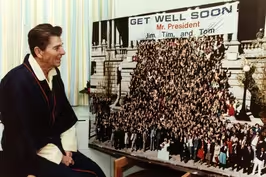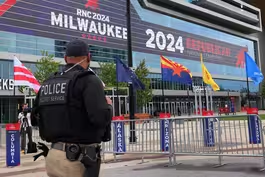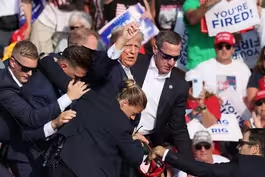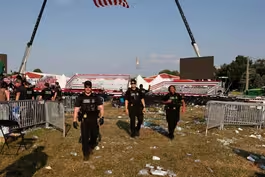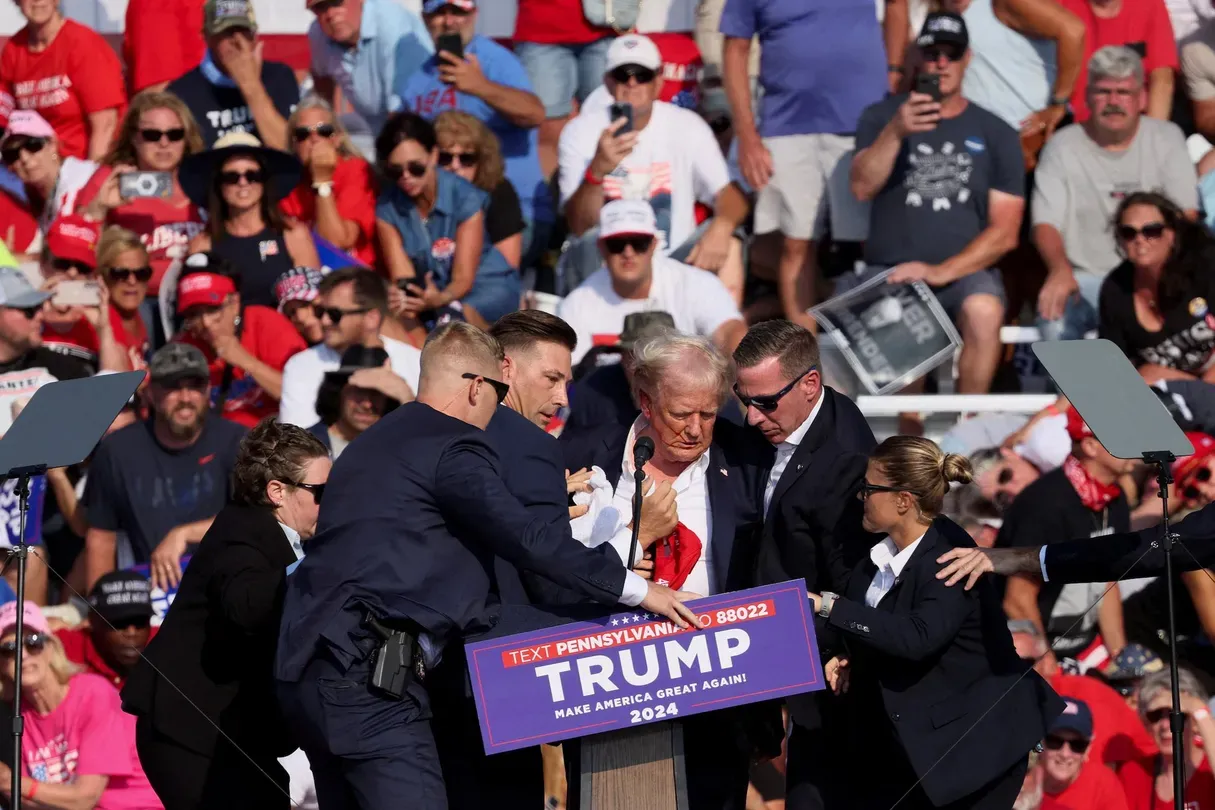

July 14, 2024 - PBS News Weekend full episode
7/14/2024 | 26m 45sVideo has Closed Captions
July 14, 2024 - PBS News Weekend full episode
Sunday on PBS News Weekend, we get the very latest on the fallout from the attempted assassination of former President Donald Trump. Then, combating the rise of political violence and violent rhetoric in the United States. Plus, Judy Woodruff reflects on the shooting of Donald Trump at this volatile moment in American history.
Problems playing video? | Closed Captioning Feedback
Problems playing video? | Closed Captioning Feedback
Major corporate funding for the PBS News Hour is provided by BDO, BNSF, Consumer Cellular, American Cruise Lines, and Raymond James. Funding for the PBS NewsHour Weekend is provided by...

July 14, 2024 - PBS News Weekend full episode
7/14/2024 | 26m 45sVideo has Closed Captions
Sunday on PBS News Weekend, we get the very latest on the fallout from the attempted assassination of former President Donald Trump. Then, combating the rise of political violence and violent rhetoric in the United States. Plus, Judy Woodruff reflects on the shooting of Donald Trump at this volatile moment in American history.
Problems playing video? | Closed Captioning Feedback
How to Watch PBS News Hour
PBS News Hour is available to stream on pbs.org and the free PBS App, available on iPhone, Apple TV, Android TV, Android smartphones, Amazon Fire TV, Amazon Fire Tablet, Roku, Samsung Smart TV, and Vizio.
Providing Support for PBS.org
Learn Moreabout PBS online sponsorshipJOHN YANG: Tonight on PBS News Weekend, the very latest on the fallout from the attempted assassination of Donald Trump.
MAN: Is only going to cause more division in this country.
And there's enough already, you're going to see more.
JOHN YANG: Then combating the rise of political violence and violent rhetoric in the United States.
And Judy Woodruff reflects on the shooting of Donald Trump at this volatile moment in American history.
(BREAK) JOHN YANG: Good evening.
I'm John Yang.
It hadn't happened in more than four decades, someone who'd been President of the United States shot in an assassination attempt.
Former President Donald Trump's wounds aren't life threatening.
But last evening shooting in Butler, Pennsylvania could take an already divisive presidential campaign into even more volatile waters.
JOHN YANG (voice-over): It began as a routine seen a swing state campaign rally on a hot summer day but as former President Donald Trump launched into his stump speech, everything changed in an instant.
DONALD TRUMP, Former U.S. President: Take a look at what happened.
JOHN YANG (voice-over): Trump dropped straight down sworn by Secret Service agents.
When agents knew that snipers had shot the gunman they raise Trump to his feet.
The right side of his face bloodied, they hustled him to the safety of an armored SUV.
This morning in the Pittsburgh suburb of Bethel Park, about 50 miles south of the rally site, police and reporters descended all trying to learn what they call it about the man investigators identified as the suspected shooter 20 year old Thomas Matthew Crooks, he was a registered Republican and in 2021, contributed $15 to a liberal voter turnout group.
The FBI is taking the lead in the investigation.
KEVIN ROJEK, Special Agent in Charge, FBI: Again, we're so working through the security apparatus that the Secret Service had in place.
What potentially happened that there's going to be a long investigation into exactly what took place and how the individual is able to get access to the location, what type of weapon he has.
JOHN YANG (voice-over): Official said the shooter was on a nearby rooftop beyond the area, the Secret Service controlled.
The shots killed a man attending the rally and critically wounded to others.
Witnesses describe the chaos.
CHARLES REETY, Eyewitness: All of a sudden it sounds like firecrackers going off.
But then I heard the shots.
And then all of a sudden somebody horrors get down on the ground and everybody's going down on the ground as low as they can get.
SAURABH SHARMA, President, American Moment: Was very clear that someone had been much more seriously injured than the President and there was visible blood everywhere.
JOHN YANG (voice-over): One person said he'd seen the would-be assassin and pointed him out to authorities.
GREG SMITH, Eyewitness: We can clearly see him with a rifle.
Absolutely.
We're pointing at him.
The police are down there running around on the ground.
We're like, hey, man, there's a guy on the roof with a rifle.
And the police are like, huh?
What?
You know, like didn't know what was going on.
JOHN YANG (voice-over): At the White House today, President Biden called for Americans to come together.
JOE BIDEN, U.S. President: There's no place in America for this kind of violence or any violence for that matter.
And assassination attempt is contrary to everything we stand for as a nation, everything.
JOHN YANG (voice-over): A similar call came from House Speaker Mike Johnson on NBC's Today.
REP. MIKE JOHNSON, Speaker of the House: We've got to turn the rhetoric down if you have political opposition and political opponents but we're all Americans and we have to treat one another with dignity and respect.
We can have heated political discourse and debates but it shouldn't be personal and we shouldn't be targeting people.
JOHN YANG (voice-over): The Trump campaign said the former president is fine.
And yesterday as Secret Service agents moved him off stage, his mood was clear.
A clenched fist and the words flight, fight.
JOHN YANG: This is the week that Trump will be officially nominated at the Republican Convention in Milwaukee.
And that's where NewsHour anchors Amna Nawaz and Geoff Bennett are tonight.
Amna, Geoff, I imagine things are going to be a little different now from what was originally planned.
AMNA NAWAZ: John, I think that's fair to say what was meant to be a celebration this week as Republican lawmakers and delegates will gather to officially nominate Donald Trump in the space behind us here is taken on a completely different tone in the wake of this assassination attempt.
Senior Republican officials are telling me that they think the party is more united than it's been that even Trump skeptics are more firmly behind him, and that his very first remarks here in this arena are now even more highly anticipated.
GEOFF BENNETT: Yeah.
And that's with the RNC saying that this convention will go ahead as planned.
Officials say there are no major structural changes planned to this week's gathering.
But security has been stepped up for the more than 50,000 politicians, delegates, members of the media who are expected here this week.
Two law enforcement sources say planning is underway to expand the security perimeter here.
And President Biden today said he ordered the director of Secret Service to review all security measures for the convention.
Political correspondent Lisa Desjardins is covering the Trump campaign and joins us now.
Lisa, it's great to see you.
LISA DESJARDINS: Hi.
GEOFF BENNETT: So give us a sense of the reaction from Republican politicians and from the Trump campaign.
LISA DESJARDINS: Right.
Well, Republicans writ large say something first of all, they wanted to acknowledge that this was an assassination attempt against not only a former president, but a man that millions of Americans would like to be president again.
After that there are two camps.
There's one camp that says it is time to tone down the rhetoric.
We heard some of that from Speaker Johnson.
The other camp is one that wants to express anger and outrage, and also wants to point a finger of blame at Democrats and President Biden as well.
One prominent example of this came from Ohio Senator JD Vance, who he posted on X today, brought up the Biden campaign and said that rhetoric from Democrats and the Biden campaign led directly to President Trump's attempted assassinations, very sharp words.
The phrase that he's talking about specifically was a phone call with donors that President Biden had last week.
The Biden campaign responded to my request about this.
And they gave me a full readout of exactly what President Biden said on that call.
They say the context here is important.
Let me read it to you, quote, I have one job, and that's to beat Donald Trump.
I'm absolutely certain I'm the best person to be able to do that.
So we're done talking about the debate.
It's time to put Trump in the bulls eye.
What the Biden campaign says he meant, of course, was that he was tired of the media focusing on him, and instead wanted it to be on Trump.
But judge for yourself that he doesn't add a lot of context here.
He did add that Trump should be in the bull's eye.
We know, of course, President Biden has said that there's no room for this kind of violence.
And we do expect President Biden to be speaking tonight to the American public.
But it's just to say that on the Republican side, there is a divide over how to respond to this.
AMNA NAWAZ: Lisa, what about on the Democratic side as well, I know you've been talking to your sources there.
How are they handling this right now.
And also, specifically with the charges about President Biden and his rhetoric fueling this.
LISA DESJARDINS: The Biden campaign says he got into the race in 2020 to begin with is a response to the kind of rhetoric that Donald Trump was using the political violence that we saw in Charlottesville.
Democrats are really struggling with how to respond because they believe this entire atmosphere of political violence was begun by Donald Trump.
But yet he was of course, the victim.
There was an attempted assassination against him.
So they're struggling with that.
They're also trying to figure out how do they do things that heal their own communities, their own districts, I can report there are several Democrats House members trying to reach out to Republican members to try and have bipartisan events.
They're hoping that that kind of thing can put the country ahead of themselves.
But they are realizing there's a new landscape for them.
Some of them are pushing back at these Republican charges.
One is Bonnie Watson Coleman, Democratic Representative from New Jersey.
She wrote on X, we should be united.
She pushed back at Marjorie Taylor Greene.
And she said we should be united against violence, not shamefully exploiting this tragedy to push partisan hatred and lies.
So there is some pushback, but it's early days.
And I think the concern here is, does the conversation actually tamp down?
Or does more anger evolve on both sides?
GEOFF BENNETT: It is early days as you say, what do your sources though, think all of this means for the race ahead.
LISA DESJARDINS: There's some very important things that are happening right now conclusions that are being made, number one, talking to prominent Democrats, especially in Congress.
They believe the conversation about President by didn't know whether he should stay in the race is over.
Now, could that change?
Yes, of course it could.
But right now, they believe they don't see a path forward to having that discussion anymore.
They think the entire environment has changed.
This is from some Democrats who want President Biden to step down, but they believe that conversation now is realistically is over the other.
There are concerns about security everywhere within governments and state governments and also the Capitol, we're going to watch that very closely.
Also, we're watching the vice presidential decision that former President Trump has to make.
Does he pick JD Vance, who is choosing in this moment to express anger and outrage?
Does he choose someone else who instead is saying, well done President Trump, thank God you survived and is trying to unite.
The country the choice he makes for Vice President, we expect that potentially in the next two days, but you know, the convention starting we're going to have it sometime soon.
That choice will tell us something about the Trump campaign and about President Trump himself.
AMNA NAWAZ: Lisa, what about voters themselves?
And I've been talking to some folks out there, how are they reading this moment?
And the temperature right now?
LISA DESJARDINS: This is what's interesting.
When you talk to members of Congress and political types, they think, oh, this might mean the election is over.
Even some Democrats are worried about this.
But when I talk to voters, I actually don't sense that kind of more movement in their voting.
I sense more real regret about where the country is, a real hope that somehow there can be a different conversation.
And we saw this even after the debate with President Biden, the numbers didn't move how much even though it was a historically bad performance.
So, I think the jury is out on exactly what this assassination attempt means in November.
For sure, as you reported, Amna.
The Republicans believe that this will create a new sense of unity.
And as much as there are so many concerning thoughts, and so many of my sources have dark thoughts right now they're worried about the country.
I'll tell you delegates here, there's a happy mood.
They feel like they can be united around Donald Trump in a way that maybe they haven't in either of his previous runs.
GEOFF BENNETT: On that point, we learned that Nikki Haley will be here later this week to address the crowd to deliver remarks.
He previously was not invited.
How do you think that the weekend's events will change the tenor and tone of this week's proceedings?
LISA DESJARDINS: I think it will change dramatically.
However, I want to caveat that with every word that former President Trump says is going to set the tone.
So if he decides to be more angry, then that we will see that on the floor.
And we will see that even personally, those of us who are on the floor in our interactions.
If he decides to say, let's rise above it, we are the party of unity.
And you know, I'm not going to blame Democrats, then I think that will absolutely affect the tone here as well.
I can tell you talking to the few delegates that I've met here, they're still coming into Milwaukee.
They would like more of that unified tone.
While they of course some of them harbor great frustration, concern and even anger over what happened.
Most of them really want to have a different kind of election.
And I can say that for voters as well.
Everyone's exhausted.
Few people in this country want this do overmatch between these two men.
This is a chance for both campaigns to reset.
Republicans think better for them.
Democrats not yet sure what they do campaigning going forward.
GEOFF BENNETT: Lisa Desjardins, thank you so much for that great reporting.
LISA DESJARDINS: Welcome.
GEOFF BENNETT: And there's certainly more to come from here in Milwaukee.
John, we'll send it back to you.
JOHN YANG: Thanks, Geoff.
Leaders around the world are condemning Saturday's assassination attempt across Europe to Asia and the Middle East.
Leaders of all political stripes express shock, condemn political violence and express their wishes for Trump's recovery.
There is other news shelling killed at least 15 people in Gaza City as Israeli military operations move forward.
Despite that Hamas says ceasefire negotiations are still on, but they accused Israel of trying to derail them.
And two familiar figures in Hollywood have died.
Actress Shannon Doherty of Beverly Hills 90210 fame had breast cancer.
She was 53 years old, and fitness icon Richard Simmons known for high energy workout videos died one day after his 76th birthday.
Still to come on PBS News Weekend.
What can be done to fight the rise of political violence in the United States?
And where yesterday fits in America's political history.
(BREAK) JOHN YANG: Studies show that over the past decade, there's been a steady increase in threats against public officials and in political violence like yesterday's assassination attempt.
Ali Rogin takes a closer look at how we got to this point.
ALI ROGIN: Those instances of political violence also include attacks on local politicians, members of Congress and their spouses and political disagreements that turned deadly.
Cynthia Miller-Idriss is the director of research at American University's Polarization and Extremism Research Innovation Lab.
Cynthia, thank you so much for being here.
This was a shocking event in a horrible tragedy for many Americans the first time that they've witnessed the attempted assassination of somebody who served as president.
But of course, there have been many other acts of political violence in recent memory, including the attack on Nancy Pelosi's husband, Paul, in 2022.
There was the congressional baseball practice shooting that injured Congressman Steve Scalise and 2017 plus many other attacks against local officials.
Why are we experiencing this uptick in political violence?
CYNTHIA MILLER-IDRISS, Director, Polarization and Extremism Research Innovation Lab: Well, first, I have to say it should be condemned.
Of course, we have to condemn the attack on former President Trump.
You know, one of my earliest political memories was the assassination attempt on President Reagan.
I think we are back in an era in which political assassinations are becoming a tactic again of in which people seek a solution to what they think are their political problems.
And that's part of the rising violence that we're seeing across the board politically, and also part of the rhetoric that has been increasing on polarized lines that positions us versus them and existential terms, so that the other starts to seem like a threat that has to be eradicated.
So it's a problem at the elite level, and it's a problem among ordinary conversations as well.
ALI ROGIN: And you mentioned the rhetoric, members of both parties have been coming out saying that both sides need to tone this down.
How much of that is at issue here?
CYNTHIA MILLER-IDRISS: The issue of political rhetoric that's divisive and even violent among elites is a huge problem.
And it has been a huge problem for many years on both sides.
However, I'm actually just as concerned about what I'm hearing from people I know and love even seeing on social media, things like you reap what you sow in response to this event.
That's just as problematic.
You have a lone actor who is not only motivated by elites who mess up, but also by ordinary citizens who give up and who lean into the idea that violence is a solution to any kind of political ideas or problems.
ALI ROGIN: One of NewsHour polls found earlier this year that one in five respondents believe Americans may have to resort to violence to get their own country back on track.
That seems like a high number.
What's your take?
CYNTHIA MILLER-IDRISS: It seems high, but it's accurate.
I mean, that's exactly the kind of data that we've been seeing.
We're seeing increasing support for political violence and also increasing willingness to engage in it among ordinary Americans.
And that's what I mean about everybody seeing this as a moment of reckoning for themselves and their own behavior, not just to wag fingers at the elites, and politicians who are behaving badly.
But to think about what you do across the dining room table, what you're doing in your classrooms, what you're doing with your colleagues and your neighbors.
Because anytime you're justifying that kind of violence, you never know who's going to overhear that, or how that contributes to the overall climate in which violence is seen as a solution.
ALI ROGIN: And to that end, do you think that everybody has a role here in lowering the overall temperature that's got us to this very tense point?
CYNTHIA MILLER-IDRISS: Absolutely.
I think everyone has not just a role, but an obligation to lower the temperature to see our basic humanity to see that no one deserves to be shot, no matter how much you disagree with what they say politically.
And to also take steps to kind of curb things like misinformation, stop retweeting it, I mean to be critical consumers, and good citizens about what you share.
I think that's one of the big takeaways here is that people have a role to play and an obligation to do it.
ALI ROGIN: And in terms of response to this, this particular event, what are you concerned about happening in terms of people perpetrating potential violent responses?
CYNTHIA MILLER-IDRISS: Another thing that ordinary people can do is to be a little bit vigilant in the coming weeks and months, because unfortunately, an event like this does create the risk that you have both kind of militant groups who see now that they may have to step up, they think and protect this candidate, as we've seen in the past, and you also see the risk of reprisal attacks.
And so, this is a real moment for people to pay attention to be vigilant, if you hear someone you know, saying something, tone it down, you know, try to correct their statements and their behaviors and steer them away from the idea that violence is a solution to anything.
ALI ROGIN: Cynthia Miller-Idriss, Director of Research at American University's Polarization and Extremism Research Innovation Lab.
Thank you so much for being here.
CYNTHIA MILLER-IDRISS: Thanks for having me.
JOHN YANG: Yesterday's assassination attempt brought immediate comparisons to the 1981 attempt on the life of Ronald Reagan.
Judy Woodruff was there that day she was NBC's House correspondent.
Judy, we should mention you are in the arena for the convention.
They're testing the sound system so we may hear some extraneous noises.
But Judy, how did those two events compare the Ronald Reagan in 1981?
And what happened yesterday?
JUDY WOODRUFF: Well, every one of these terrible acts John, of course, is different.
But I was there that day it was March the 30th 1981, White House correspondent for NBC News.
Ronald Reagan had only been in office for two months, I was part of the press small press pool, following him to make a speech at the Washington Hilton Hotel.
He went into the hotel made this speech we were outside waiting for him.
I would in fact, I was 30 feet away from his limousine, ready to ask a question, which I was doing when he came out, waved at the crowd.
And I was yelling at the same time I started hearing a pop, pop, pop sounded like firecrackers.
But immediately people started yelling get down, it was clear that it was gunshots.
The motorcade with President Reagan moved away.
We didn't know it then.
But it turned out he had been hit, he almost died.
But what I could see were lying on the ground, Jim Brady, the White House press secretary with blood coming out of his head, and three other men who were part of a protective detail.
It's a day I ran across the street to use a phone.
Thankfully, both of these men survived.
But it's the day I will never, ever forget.
JOHN YANG: A lot of the things you're talking about, given yesterday of the current state of political discourse in the country.
You've been traveling the country as our viewers know, for the America at Crossroads series, talking to a lot of people.
What's your sense of how people feel about the way politics is being dealt with today and being discussed?
JUDY WOODRUFF: You're right, John, we have been traveling the United States, we counted it up.
We've been to 23 states.
So far, we've talked to dozens and dozens of ordinary Americans, we've talked to experts, virtually everybody agrees we are historically divided right now, maybe the worst since the Civil War.
Our discourse has deteriorated a lot of agreement and disagreement about why that is some of it has historical roots in the rise of the modern anti-government movement.
But what we know is that there is a consensus among Republicans especially but even Democrats, that the news media, the media, the social media has a role to play.
Just yesterday, I spoke with 22-year old Republican delegate to this convention.
His name is Logan Glass.
He's from Alabama.
He was part of a group of delegates I spoke with and I asked him what he thought was contributing to our current division.
Here's what he said.
LOGAN GLASS, Republican National Convention Delegate, Alabama: I'm going to point the finger at the media.
I don't I don't think the media has done much to bring us together.
I think the liberal news media has done a lot to divide us.
I think the media has magnified the divide.
I think they have made it the issue that it is.
JUDY WOODRUFF: And again, John, this is what we were hearing we've been hearing from Republicans and Democrats.
We talked to him before the shooting.
But what Logan Glass said to me right after that was he said it's going to take a change of generations.
He said the older generation has managed to coarsen (ph) our rhetoric, coarsen (ph) discourse, the younger generation is going to have to step in.
JOHN YANG: To that point, we're hearing a lot of calls for unity for lowering the temperature as it were today.
In your view, what's it going to take to get that to happen?
JUDY WOODRUFF: I wish I had an answer, John, like all of us.
I mean, we are looking for signals of unity.
If our political leaders could come together and say to the country, it's time for this kind of thing, this terrible violence and his language to stop.
We'll see whether that happens.
But I have to bring up the question and the issue of guns, John.
When John F. Kennedy was assassinated, there were a roughly 67 million guns estimated in this country today, 2024, there are around 400 million guns in America.
Guns are not the only cause of our violence.
They're not the only cause certainly of our course or discourse, but they are in issue.
I would tell you just quickly in the state of Tennessee, there was a terrible church shooting there.
About a year and a half ago, people tried to come together including gun enthusiast, Second Amendment supporters, people who are big supporters of gun rights to try to get the Tennessee legislature to find common ground over reducing gun violence.
They were not able to do that by, bringing people together across the divide.
So it's going to take work.
It's going to take dedication.
We're not there yet.
JOHN YANG: Not there yet.
Judy Woodruff in Milwaukee.
Thank you very much.
Judy, Amna, and Geoff will all be in Milwaukee this week for PBS News Special Coverage of the Republican National Convention begins each night at 8:00 p.m. Eastern and it streams gavel to gavel on our website and our YouTube page.
MAN: The 2024 campaign heats up.
DONALD TRUMP: We're going to fire crooked Joe Biden.
We are going to make America great again.
MAN: Can former President Trump convince voters to send him back to the White House?
DONALD TRUMP: This election is a choice between strength and weakness.
MAN: How would he take on the challenges facing America at home and abroad, a PBS News Special the Republican National Convention coverage begins on Monday, July 15, at 8:00 p.m. Eastern.
JOHN YANG: And that is PBS News Weekend for this momentous Sunday.
Tonight at 8:00 p.m. on PBS, special coverage of President Biden's address to the nation.
That's 8:00 p.m. Eastern.
I'm John Yang.
For all of my colleagues, thanks for joining us.
Good night.
How Trump’s assassination attempt compares Reagan’s in 1981
Video has Closed Captions
Clip: 7/14/2024 | 5m 10s | How Trump’s assassination attempt compares to the attempt on Reagan in 1981 (5m 10s)
The political fallout of the Trump rally shooting
Video has Closed Captions
Clip: 7/14/2024 | 7m 59s | As RNC looms, what to know about the political fallout of the Trump rally shooting (7m 59s)
What to know about the attempted assassination of Trump
Video has Closed Captions
Clip: 7/14/2024 | 3m 18s | What happened during and after the attempted assassination of Donald Trump (3m 18s)
Why political violence is on the rise in the United States
Video has Closed Captions
Clip: 7/14/2024 | 5m 15s | Why political violence and violent threats are on the rise in the United States (5m 15s)
Providing Support for PBS.org
Learn Moreabout PBS online sponsorship
- News and Public Affairs

FRONTLINE is investigative journalism that questions, explains and changes our world.

- News and Public Affairs

Amanpour and Company features conversations with leaders and decision makers.












Support for PBS provided by:
Major corporate funding for the PBS News Hour is provided by BDO, BNSF, Consumer Cellular, American Cruise Lines, and Raymond James. Funding for the PBS NewsHour Weekend is provided by...
